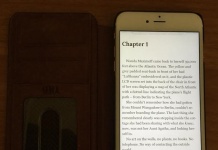 We had a lively discussion over the weekend about the interoperability of ebooks and whether consumers cared about it. We had arguments on both sides, and here’s someone else’s opinion. On his own blog, Andy Updegrove responded to DBW’s article about why proprietary ebook formats work.
We had a lively discussion over the weekend about the interoperability of ebooks and whether consumers cared about it. We had arguments on both sides, and here’s someone else’s opinion. On his own blog, Andy Updegrove responded to DBW’s article about why proprietary ebook formats work.
Updegrove was outspoken in his contempt for the DBW position.
This is the same nonsense that has been propounded in every single media format that has ever been created where there is a dominant vendor that wants to stay that way. It’s what Microsoft has contended for decades about desktop software formats that underlie its Office productivity suite, and what we also saw in the early days of digital music. In each case, vendors (or, in this case, sales and distribution channels) have sought to gain, or retain, monopolist control and lock in their customers by fighting the creation and universal adoption of a standard that would allow freedom of movement and true competition in the marketplace.
There’s lots more in his post about Microsoft and what they did to drive competing word processing programs out of business. (I still miss Word Perfect.)
However, this observation was the one which struck home for me:
Authors are the victims of this nonsense at both ends of the supply chain, because Microsoft still controls the desktop (I’ve written about the consequences of that reality here), and Amazon still controls the distribution channel to most readers. That means that instead of being able to simply create a book in your favorite word processor and publish it directly to every Internet bookstore with a few keystrokes, you’re stuck with a miserable experience preparing your files, and then uploading them multiple times at multiple sites with multiple issues to deal with at each.
Yes, yes! A thousand times yes! As an author, I’ve experienced this directly. I’ve gone through the process of preparing files for both Amazon and Nook Press. And having the books look horrible on Nook Press. And several frustrating hours later finally figuring out a work around. Which is why I now pay someone to do it all for me. But why should I have to?
I know. Lots of people have told me that Scrivener will produce a good epub which can be converted to mobi and uploaded to Amazon. I’ve heard raves about InDesign and I’ve heard horror stories of InDesign. I have reasons for not wanting to buy Scrivener (no iPad app yet–although it’s supposed to be available this year). I’m about to purchase InDesign for a cover design class, but it’s an expensive program (monthly subscription), and I’m sure many authors would rather not have to purchase it. Spending the money instead on a good copy editor makes a lot of sense.
So his comment about not being able to use our favorite word processing program and upload with a few keystrokes struck home with me. I don’t need much from my ebook. Drop caps at chapter breaks are nice. Decent kerning would be appreciated. With a decent choice of fonts to round it all out. (Yes, I mostly read fiction so my needs are modest.) It seems silly that it’s so difficult to produce a book which meets those needs and looks good on all major platforms. If a consistent standard would get us there, I’m all for it. Although the realist in me believes it’s not happening any time soon.


































Juli,
I think the lack of easy file uploading is really underlined by your comment about all you need. Today, at least, most eBooks are fiction. That means no tables, to footnotes, no lists of authorities, or anything else that would be genuinely tricky. There’s really not excuse for life to be so difficult at this level – other than that there’s nothing in it for the publishers, channel partners and vendors – indeed, just the opposite.
Given the fact that authors have virtually no way to assert any leverage over those named above, the likelihood of making progress is low. Sadly.
– Andy
Juli, are you accepting his argument that Amazon is to blame for B&N screwing up Nook Press?
That seems to be what you are saying.
@Nate, no, I’m not saying Amazon screwed up Nook Press. I am saying that, as an author, dealing with multiple formats (and Nook Press is the worst), is a pain in the ass. I’d personally much rather deal with only one. I don’t think I said anything that blamed Amazon for Nook. B&N is quite capable of screwing up without any help.
I’m in the indifferent camp. Of course it would be nice if publishers, vendors, and creators all played together without the interoperablity rigamarole.
But who has the most to gain? As a reader there is always a chance I’ll want to transfer my Kindle books to Kobo someday. (I’d walk away from Amazon if they ever enforced their ads on all devices, for example.).
The publishers of the books I read seem to be creating acceptable ebook editions (and I’m currently leaning towards non-fiction with its footnotes and whatnots over popular novels.).
Are the publishers chomping at the bit for one format to rule them all? How many readers are truly stymied by different formats across various devices? Or is this a movement championed mostly by indie authors?
If readers, writers, punishers, vendors want change, there needs to be a good reason to do so and will probably require a movement with clout to push it along.
I’m sorry, Juli, I misunderstood.
@Nate, no worries. It was almost worth the one semi-blissful moment of thinking about finding someone else to blame for Nook Press. 🙂
[…] After downloading the Calibre plugin to convert my books to kePub, everything works well now. However, seriously? Three versions of all my books in Calibre: ePub, kePub and mobi/azw? I’m even more convinced that we need better ebook standards! […]